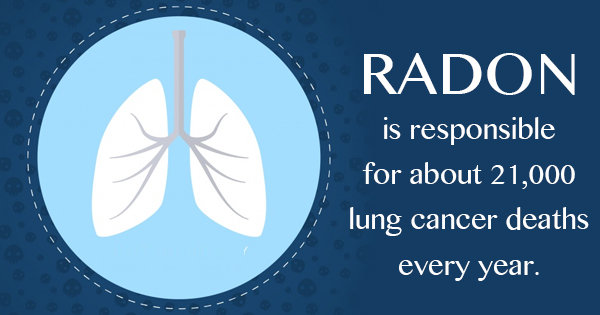 Radon is the chemical element with atomic number 86, a rare radioactive gas belonging to the noble gas series. Radon is not a gas that is safe for human beings to be exposed to. Unfortunately, approximately one in 15 homes in the United States have estimated levels of radon at or above the EPA action level.
Radon is the chemical element with atomic number 86, a rare radioactive gas belonging to the noble gas series. Radon is not a gas that is safe for human beings to be exposed to. Unfortunately, approximately one in 15 homes in the United States have estimated levels of radon at or above the EPA action level.
Dangers of Radon in Your Home
One of the biggest risks of radon exposure is lung cancer. There are many studies that have been done to validate the connection between radon exposure and lung cancer. According to the EPA, smoking, radon, and secondhand smoke are the three leading causes of lung cancer. Radon is the number one cause among nonsmokers.
Radon is responsible for about 21,000 lung cancer deaths every year. About 2,900 of these deaths occur among people who have never smoked, according to the EPA. Unfortunately, there have been many other studies that show this relationship. It is undeniable based on empirical evidence that radon plays a major role in the incidence of lung cancer.
How Is Radon Getting In Your Home?
There are several ways that radon can get into your home. Having cracks in the foundation is one of the most common ways that radon makes its way into basements of residents. Any kind of crack, gap, or cavity in pipes or walls can also allow radon to get in. Your water supply is another place that radon can seep its way into the basement of your home. This is why residential radon testing is so important. It can very easily get into your home. Testing for radon can literally save a life.
The Best Ways To Prevent Radon From Getting Into Your Home
Preventing radon in your home can be a simple process. Sealing off any cracks or leaks in your foundation or plumbing will hinder radon’s entrance into your home. Putting protective layers and proper ventilation in crawl spaces and basements can also help prevent radon from being able to leak into your home.
Having radon levels in your home can be very serious. The EPA reports that several homes throughout the country have unsafe radon levels. Residential radon testing can tell you if you’re safe, and what you need to do to prevent issues in the future.

Recent Comments